现代大学英语第一册 Unit1 Half A Day
现代大学英语精读LessonOneHalfaDay原文及翻译
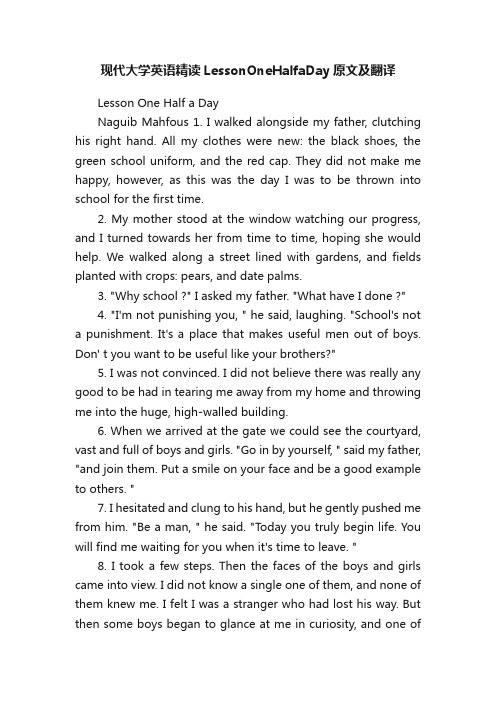
现代大学英语精读LessonOneHalfaDay原文及翻译Lesson One Half a DayNaguib Mahfous 1. I walked alongside my father, clutching his right hand. All my clothes were new: the black shoes, the green school uniform, and the red cap. They did not make me happy, however, as this was the day I was to be thrown into school for the first time.2. My mother stood at the window watching our progress, and I turned towards her from time to time, hoping she would help. We walked along a street lined with gardens, and fields planted with crops: pears, and date palms.3. "Why school ?" I asked my father. "What have I done ?"4. "I'm not punishing you, " he said, laughing. "School's nota punishment. It's a place that makes useful men out of boys. Don' t you want to be useful like your brothers?"5. I was not convinced. I did not believe there was really any good to be had in tearing me away from my home and throwing me into the huge, high-walled building.6. When we arrived at the gate we could see the courtyard, vast and full of boys and girls. "Go in by yourself, " said my father, "and join them. Put a smile on your face and be a good example to others. "7. I hesitated and clung to his hand, but he gently pushed me from him. "Be a man, " he said. "T oday you truly begin life. You will find me waiting for you when it's time to leave. "8. I took a few steps. Then the faces of the boys and girls came into view. I did not know a single one of them, and none of them knew me. I felt I was a stranger who had lost his way. But then some boys began to glance at me in curiosity, and one ofthem came over and asked, "Who brought you?"9. "My father, " I whispered.10. "My father's dead, " he said simply.11. I did not know what to say. The gate was now closed. Some of the children burst into tears. The bell rang. A lady came along, followed by a group of men. The men began sorting us into ranks. We were formed into an intricate pattern in the great courtyard surrounded by high buildings; from each floor we were overlooked by a long balcony roofed in wood.12. "This is your new home, "said the woman. "There are mothers and fathers here, too. Everything that is enjoyable and beneficial is here. So dry your tears and face life joyfully. "13. Well, it seemed that my misgivings had had no basis. From thefirst moments I made many friends and fell in love with many girls. I had never imagined school would have this rich variety of experiences.14. We played all sorts of games. In the music room we sang our first songs. We also had our first introduction to language. We saw a globe of the Earth, which revolved and showed the various continents and countries. We started learning numbers, and we were told the story of the Creator of the universe. We ate delicious food, took a little nap, and woke up to go on with friendship and love, playing and learning.15. Our path, however, was not totally sweet and unclouded. We had to be observant and patient. It was not all a matter of playing and fooling around. Rivalries could bring about pain and hatred or give rise to fighting. And while the lady would sometimes smile, she would often yell and scold. Even more frequently she would resort to physical punishment.16. In addition, the time for changing one' s mind was over and gone and there was no question of ever returning to the paradise of home. Nothing lay ahead of us but exertion, struggle, and perseverance. Those who were able took advantage of the opportunities for success and happiness that presented themselves.17. The bell rang, announcing the passing of the day and the end of work. The children rushed toward the gate, which was opened again. I said goodbye to friends and sweethearts and passed through the gate. Ilooked around but found no trace of my father, who had promised to be there. I stepped aside to wait. When I had waited for a long time in vain, I decided to return home on my own. I walked a few steps, then came to a startled halt. Good Lord! Where was the street lined with gardens? Where had it disappeared to? When did all these cars invade it? And when did all these people come to rest on its surface? How did these hills of rubbish find their way to cover its sides? And where were the fields that bordered it? High buildings had taken over, the street was full of children, and disturbing noises shook the air. Here and there stood conjurers showing off their tricks or making snakes appear from baskets. Then there was a band announcing the opening of a circus, with clowns and weight lifters walking in front.18. Good God! I was in a daze. My head spun. I almost went crazy. How could all this have happened in half a day, between early morning and sunset? I would find the answer at home with my father. But where was my home? I hurried towards the crossroads, because I remembered that I had to cross the street to reach our house, but the stream of cars would not let up.Extremely irritated, I wondered when I would be able to cross.19. I stood there a long time, until the young boy employed at the ironing shop on the corner came up to me.20. He stretched out his arm and said, "Grandpa, let me take you across."第一课半日1 我走在父亲的一侧,牢牢地抓着他的右手。
《现代大学英语精读1》第1课Half-a-Day-课文讲解

Half a DayNaguibMahfousAbout the AuthorName: NaguibMahfous纳吉布·马哈福兹Nationality:EgyptianDates: From Dec.1911 to Aug. 2006 Birthplace:an old quarter of CairoEducation: studied philosophyat auniversity ofCairo, graduating in 1934.Job: in university administrationas a civil servantas a journalist(记者)Influence: 1st Arab to win the Nobel Prize for literature in 1988described as "a Dickens of the Cairo cafés" and "the Balzac of Egypt".Half of his novels have been made into filmsAbout the AuthorWorks: no fewer than 30 novels, more than 100 short stories, and more than 200 articles●the Cairo Trilogy in 1957●Children of Gebelawi in 1959 (Prize novel for the reasonthat "who, through works rich in nuance - nowclear-sightedly realistic, now evocatively ambiguous -has formed an Arabian narrative art that applies to allmankind"(他通过大量刻画入微的作品—洞察一切的现实主义,唤起人们树立雄心—形成了全人类所欣赏的阿拉伯语言艺术)●the Thief and the Dogs in 1961《小偷与狗》●Small Talk on the Nile in 1966《尼罗河上的絮语》About the Half a Day●First published in Arabic in 1989as part of a short story collectionentitled The False Dawn.●Included in an English-language collection entitled The Time andthe Place in 1991.●Belongs to his later phase and characterized by a shift from socialrealism to a more modern, experimental mode of writing.●An allegorical taleimplicates a commentary on the humancondition; an entire life span is experienced as only ''half a day'' in the school of life and also alludes to the cycle of life, whereby the narrator passes through childhood, middle age and old age in the course of one day.●Uses a strategy commonly used in fiction writing –theprotagonist returns after being absent for a short time to find everything changed beyond recognition. The best example is Rip Van Winkle, a short story by American writer, Washington Irving.●This technique is often used to emphasize rapid changes insociety.Structure●Plot故事情节: a little boy’s first time to go to school●Setting背景: on the way to schoolat schoolon the way home●Protagonist/Narrator主人公/讲述人: “I”–the boy in thestory●Theme of the story主题: rapid changes in societyThree Parts●Para. 1-7: t he boy’s reluctance to go to schoolHis misgivings about school●Para. 8-16: t he Boy’s life at school:Rich and colorful, Requiringdiscipline and hard workPara. 17-20: at the end of school day:Everything has changed!●Detailed Analysis—para1S1---I walked alongside my father, clutching his right hand.1. What’s the function of the –ing form clutchinghis right hand?2. Who clutched his right hand?3. Can you find some other –ing form in this passage whose function is the same as clutching his right hand?S2---All my clothes were new:the black shoes, the green school uniform, and the red cap.S3---They did not make me happy, however, as this was the day I was to be thrown into school for the first time.1. What does They refer to?2. What is the function of the clause I was to bethrown into school for the first time?3. Can you identify the sentence type?Simple sentence, Compound sentenceComplex sentence orCompound-complex sentence4. What’s the p art of speech of however?the minute/moment (that)... as soon as... 一...就...: I want to see him the minute (that) he arrives. 他一来到我就要见他.Detailed Analysis—para2S1---My mother stood at the window watching our progress, and I turned towards her from time to time, hoping she would help.1. Can you identify the sentence type?2. Can you find the logical subject of the present participle phrases watching our progress and hoping she would help?3. What do you get from the phrase hoping she would help?4. What does watching our progress mean?Detailed Analysis—para2S2---We walked along a street lined with gardens and fields planted with crops, pears, and date palms.1. What’s the function of lined with gardens and planted with crops?2. Can you put in the omitted parts of lined with gardens and planted with crops?3. Can you find some more in this passage?Descriptive PhrasesCompare:1.People who are unhappy with the amount of spam they receiveshould write to their lawmakers.2.People unhappy with the amount of spam they receive should writeto their lawmakers.3.Pierre Omidyar, who is the founder of eBay, is one of the richest menin the world.4.Pierre Omidyar, the founder of eBay, is one of the richest men in theworld.5.One-half of all of the e-mail that is sent today is spam.6.One-half of all of the e-mail sent today is spam.7.There are about 11 million items that are listed on eBay.8.There are about 11 million items listed on eBay.9.A man who is living in Florida retired at the age of 37 after makingmillions in the spam business.10.A man living in Florida retired at the age of 37 after making millions inthe spam business.Detailed Analysis—para2S2---We walked along a street lined with gardens, and fields planted with crops: pears, and date palms.Descriptive PhrasesCompare:11.Shoppers who are using eBay can locate a hard-to-find item.12.Shoppers using eBay can locate a hard-to-find item.13.Spam, which is unwanted commercial e-mail, is an annoyingproblem.14.Spam, unwanted commercial e-mail, is an annoying problem.15.eBay, which is an auction Web site, is very popular.16.eBay, an auction Web site, is very popular.17.A man who is in Florida retired at the age of 37.18.A man in Florida retired at the age of 37.19.Pierre, who is from France, created eBay.20.Pierre, from France, created eBay.Detailed Analysis—para2S2---We walked along a street lined with gardens, and fields planted with crops: pears, and date palms.3. From above, can you summarize the similarities of all these sentences?Descriptive PhrasesLanguage Note:1. A descriptive phrase can be essential or nonessential. A nonessentialphrase is set off by commas.People unhappy with the amount of spam they receive should writeto their lawmakers.Pierre Omidyar, the founder of eBay, is one of the richest men in theworld.2.An appositive is always nonessential., an online store, is a very popular Web site.Detailed Analysis—para3S1---"Why school?" I asked my father. "What have I done?”1. What’s the feeling of the boy?2. What’s the elliptical sentence?3. What is the rhetorical question?Summary—para1-3What do you get from these paragraphs?The boy’s feelingHelpless—new clothes did not make me happy Thrown into schoolFrom time to timeHoping she would helpWhy school? What have I done?Detailed Analysis—para4S3---It's a place that makes useful men out of boys.1. make…(out) of sb/sth: cause sb/sth to be orbecome sth使某人[某事物]处於某状况或变成某事物:使其成为争论之点.Eg.W e'll make a footballer of him yet.我们还是要把他造就成优秀的足球运动员Don't make a habit of it/Don't make it a habit.不要养成那样的习惯.2. What is the function of that makes useful menout of boys? Can you find some more in this passage?3. Can you identify the sentence type?Detailed Analysis—para5S2---I did not believe there was really any good to be had in tearing me away from my home and throwing me into the huge, high-walled building.1. It is no good/use doing sth. Or There is no good to be had in doing sth.: It is not useful to do 做…没有什么用处eg. It’s no good crying over spilt milk. 覆水难收It’s no use talking to him2. tearoneself/sb. away from ...:leave sb/sthreluctantly 勉强使离开,忍痛舍去Eg.Do tear yourself away from the television and come out for a walk. 你别舍不得离开电视了, 出去散散步吧.The young artist couldn't tear himself awayfrom da Vinci's Mona Lisa.He couldn’t tear himself away from the book.3. Can you identify the sentence type?Detailed Analysis—para6S1---When we arrived at the gate we could see the courtyard, vast and full of boys and girls.1. What’s the function of the adjective phrase vastand full of boys and girls?2. Can you put in the omitted parts of this phrase?3. Can you identify the sentence type?Detailed Analysis—para7S1---I hesitated and clung to his hand, but he gently pushed me from him.1. Can you identify the sentence type?2. What’s the base/original form of clung?Fling: 扔, 抛, 掷Sting: 蜇(伤), 刺(伤)(某人)String: 装弦, 用线或细绳将…穿起来Swing: 摆动, 摇摆S2---“Be a man,” he said.1. What does man mean here?S3---Y ou will find me waiting for you when it's time to leave. "1. What’s the function of waiting for you?2. Can you tell the difference between object complement andpresent participle as adverbial?Can you tell the difference between object complement and direct object?3. Can you identify the sentence type?4. Complete the Ex6 on page 14.Detailed Analysis—para8I took a few steps. Then the faces of the boys and girls came into view. I did not know a single one of them, and none of them knew me. I felt I was a stranger who had lost his way. But then some boys began to glance at me in curiosity,and one of them came over and asked, "Who brought you?"Detailed Analysis—para11S1---I did not know what to say.1. question word + to do sthS2---The gate was now closed.1. What’s the function of closed? Is it a past participle as adjective or a past participle to form a passive voice?Detailed Analysis—para11S3---Some of the children burst into tears.burst into: send out or produce sth suddenly and violently 突然而猛烈地发出或产生出某事物eg. The aircraft crashed and burst into flames. 飞机坠毁起火.burst into tears, song, angry speech突然哭﹑唱﹑吵起来trees bursting into leaf/ bloom/ blossom/flower 长出新叶[开花]的树木burst out●speak suddenly and with feeling; exclaim突然激动地说; 叫嚷:Eg.`I hate you!' she burst out.‘我讨厌你!’ 她叫嚷道.●(with the -ing form 与-ing连用) suddenly begin (doing sth) 突然开始(做某事):Eg.burst out crying/laughing/singing突然哭起来[笑起来/唱起来].Detailed Analysis—para11S5---A lady came along, followed by a group of men.1. What’s the function of followed by a group of men?S6---The men began sorting us into ranks.1. sort: ~ sth (out) (into sth); ~ sth (out) from stharrange things in groups; separate things of one type, class, etc from things ofother types, etc 将事物分类; 整理:Eg. He was sorting his foreign stamps into piles. 他正在整理外国邮票, 都分成一摞一摞的.We must sort out the good apples from the bad. 咱们得把好苹果拣出来, 同坏的分开.2. Can you list some verbs which should be followed by doing sth or by to do sth or both?The following verbs take a gerund.admit advise* allow* appreciate avoid consider delaydeny discuss dislike enjoy escape excuse finish forbid*imagine include keep (on) mind miss permit*postpone practice quitrecommendresentresist risk stand stop suggest*Allow doing sth allow sb to do sthDetailed Analysis—para11S7---We were formed into an intricate pattern in the great courtyard surrounded by high buildings;from each floor we wereoverlooked by a long balcony roofed in wood.1. Can you identify the sentence type? Why?2. What’s the function of the past participle phrases surrounded by high buildings and roofed in wood?Detailed Analysis—para13S1---Well, it seemed that my misgivings had had no basis.1. What’s the function of the clause that my misgivings had had no basis?2. Why the author use the two different tenses?3. What does the author convey to the reader?S2---From the first moments I made many friends and fell in love with many girls.1. What does the author convey to the reader?S3---I had never imagined school would have this rich variety of experiences.1.How can you explain the two different tenses?2.What are the experiences?Detailed Analysis—para14S2---In the music room we sang our first songs. 1. What’s the base/original form of sang?Bgin, drink, ring, swim, spring*shrink收缩; 萎缩shrank, shrunk/shrunken (定语) *sink下沉sank, sunk/sunken(定语)*spin旋转spun/span(古语), spunS4---We saw a globe of the Earth, which revolved and showed the various continents andcountries.1. What’s the function of the clause which revolvedand showed the various continents andcountries?S5---We started learning numbers, and we were told the story of the Creator of the universe.1. What does the Creator means?2. Can you identify the sentence type? Why?Detailed Analysis—para14S6---We ate delicious food, took a little nap, and woke up to go on with friendship and love, playing and learning.1. Can you identify the sentence type? Why?2. What’s the function of the phrase playing and learning?3. What’s the function of the infinitive phrase to go on with friendship and love?4. What’s the difference between the result infinitive and purpose infinitive?Detailed Analysis—para15S1---Our path, however, was not totally sweet and unclouded.1. What’s part of speech of however?S2---We had to be observant and patient.1.observant●quick at noticing things 善於观察的; 机警的; 注意的:eg. An observant shop assistant had remembered exactly what the man was wearing. 有个机警的店员准确记得那个男子的穿着.Journalists are trained to be observant. 新闻记者都要训练成有敏锐观察力的人.●(fml文) careful to obey laws, customs, traditions, etc(对法律﹑习俗﹑传统等)谨慎遵守的: Eg. observant of the rules 遵守规则.Detailed Analysis—para15S3---It was not all a matter of playing and fooling around.1. a matter of: situation, question or issue that depends on sth else 取决於某事的情况﹑问题或事情:Eg. Dealing with these problems is all a matter of experience.处理这些问题全凭经验.Success in business is simply a matter of knowing when totake a chance. 商业上的成功就在於把握时机.2. fool around/about:●behave stupidly or foolishly 干蠢事:eg. Stop fooling about with that knife or someone will get hurt.不要摆弄那把刀, 会伤人的.●waste time; be idle 虚度光阴; 胡混:eg. I was meant to be working on Sunday, but I just fooled around all day. 星期日我本应工作的, 但却闲混了一整天.3. What’s the part of speech of the word all?Detailed Analysis—para15S4---Rivalries could bring about pain and hatred or give rise to fighting.1. bring about: cause sth to happen 使(某事物)发生; 导致:Eg.bring about reforms, a war, sb's ruin导致改革﹑战争﹑某人的毁灭The Liberals wish to bring about changesin the electoral system.自由党人想要改变选举制度.2. give rise to sth: (fml文) cause sth引起﹑导致某事物:Eg. Her disappearance gave rise to the wildest rumours.她失踪一事引起了各种流言蜚语.3. What does Rivalries means?S5----And while the lady would sometimes smile, she would often yell and scold.1. What’s the part of speech of while?2. What does would mean?Detailed Analysis—para15S6---Even more frequently she would resort to physical punishment.1.resort to sth: make use of sth for help; adopt sthas an expedient 求助於或诉诸某事物; 采取某手段或方法应急或作为对策:eg. If negotiations fail we shall have to resort to strike action.假若谈判失败, 我们就采取罢工行动.resort to violence, deception, trickery, etc靠暴力﹑欺骗﹑欺诈等.2. What does physical punishment means?Detailed Analysis—para16S1---In addition, the time for changing one’s mind was over and gone and there was no question of ever returning to the paradise of home.1.there is some/no question of sth happening/sb doing sth there is a/no possibility of 有[没有]...的可能性:eg. There was some question of selling thebusiness. 有可能将公司转让.There will be no question of anyone beingmade redundant(多余的, 被解雇的, 失业的). 决不可能裁掉任何人2. the paradise of home: metaphor3. What’s metaphor and what’s difference betweenmetaphor and simile?Detailed Analysis—para16S2---Nothing lay ahead of us but exertion, struggle, and perseverance.1. What’s the part of speech of but?2. but(used after the negatives nobody, none, nowhere, etc, thequestion words who, where, etc, and also all, everyone, anyone, etc 用於否定词nobody﹑none﹑nowhere等和疑问词who﹑where等之後, 以及all﹑everyone﹑anyone等之後) except (sb/sth); apart from; other than 除(某人[某事物])以外; 此外;不同於:Eg. Everyone was there but him. 除了他之外, 所有的人都在.Nobody but you could be so selfish.除了你之外, 谁也不会这样自私.Nothing but trouble will come of this plan.这个计划只能带来麻烦.Right now he thinks about nothing but his research.She ate nothing but an apple for lunch.Detailed Analysis—para16S3---Those who were able took advantage of the opportunities for success and happiness that presented themselves.1. Can you analyze the sentence structure?2. take advantage of●make use of sth well, properly, etc充分利用:eg. They took full advantage of the hotel's facilities.他们充分利用旅馆设备.●make use of sb/sth unfairly or deceitfully to get what one wants利用sb或sth:eg. He's using his charm to try to take advantage of her.他用魅力企图占她的便宜.3. present●present onself for sth (of a person) appear or attend (指人)出现, 出席:eg. You will be asked to present yourself for interview. 要求你到场面试.I have to present myself in court on 20 May. 我须於5月20日出庭.●present itself to sb(of an opportunity, a solution, etc) show itself (to sb);occur(指机会﹑解决办法等)(对某人)显露, 产生:eg. A wonderful opportunity suddenly presented itself.突然有了个绝妙的机会.The answer presented itself to him when he looked at the problem again.Detailed Analysis—para17S1---The bell rang, announcing the passing of the day and the end of work.1. What’s the function of announcing the passing of the day?S2---The children rushed toward the gate, which was opened again.1. What’s the function of the clause which was opened again?S4---I looked around but found no trace of my father, who had promised to be there.1. What’s the function of the clause who had promised to be there?2. How do you understand the different tenses?Detailed Analysis—para17S6---When I had waited for a long time in vain, I decided to return home on my own.1. Can you identify the sentence type?2. What’s part of speech of home and return?3. in vain:●with no result; uselessly 无结果地; 徒然:eg. try in vain to sleep 怎麽也睡不着.●fruitless or useless 无效果的; 无用的:eg. All our work was in vain. 我们的工作全都白干了.4. on my own: alone, by oneself; without helpS7---I walked a few steps, then came to a startled halt.1. come/draw to a halt: to stopEg. Production has come to a halt owing to the lackof raw materials.由于缺少原料,生产已陷入停顿。
Half a Day 课后答案
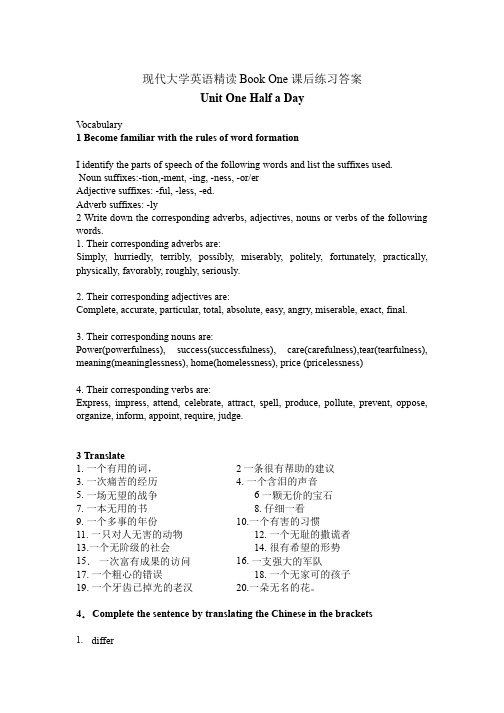
现代大学英语精读Book One 课后练习答案Unit One Half a DayV ocabulary1 Become familiar with the rules of word formationI identify the parts of speech of the following words and list the suffixes used.Noun suffixes:-tion,-ment, -ing, -ness, -or/erAdjective suffixes: -ful, -less, -ed.Adverb suffixes: -ly2 Write down the corresponding adverbs, adjectives, nouns or verbs of the following words.1. Their corresponding adverbs are:Simply,hurriedly,terribly,possibly,miserably,politely,fortunately,practically, physically, favorably, roughly, seriously.2. Their corresponding adjectives are:Complete, accurate, particular, total, absolute, easy, angry, miserable, exact, final.3. Their corresponding nouns are:Power(powerfulness),success(successfulness),care(carefulness),tear(tearfulness), meaning(meaninglessness), home(homelessness), price (pricelessness)4. Their corresponding verbs are:Express, impress, attend, celebrate, attract, spell, produce, pollute, prevent, oppose, organize, inform, appoint, require, judge.3 Translate1. 一个有用的词,2一条很有帮助的建议3. 一次痛苦的经历4. 一个含泪的声音5. 一场无望的战争 6 一颗无价的宝石7. 一本无用的书8. 仔细一看9. 一个多事的年份10.一个有害的习惯11. 一只对人无害的动物12. 一个无耻的撒谎者13.一个无阶级的社会14. 很有希望的形势15.一次富有成果的访问16. 一支强大的军队17. 一个粗心的错误18. 一个无家可的孩子19. 一个牙齿已掉光的老汉20.一朵无名的花。
现代大学英语1 lesson 1 half a day

We walked on a path lined with trees on both sides.
他拿出一个盛满油的瓶子。
He took out a bottle that was filled with oil. He took out a bottle filled with oil. 很多人都不喜欢浙江货。 Many people don’t like the products that are made in Zhejiang. Many people don’t like the products made in Zhejiang.
God helps those who help themselves.
Complete the following with the structure: Those who are able to take the chance…. I appreciate those who…
9. With + n+ Ving (para. 17)
The classroom was noisy, with students coming in and out of it. With the October holidays drawing near, people begin to think where to travel. She started on the journey, with nobody accompanying her.
现代大学英语精读Lesson One Half a Day原文及翻译
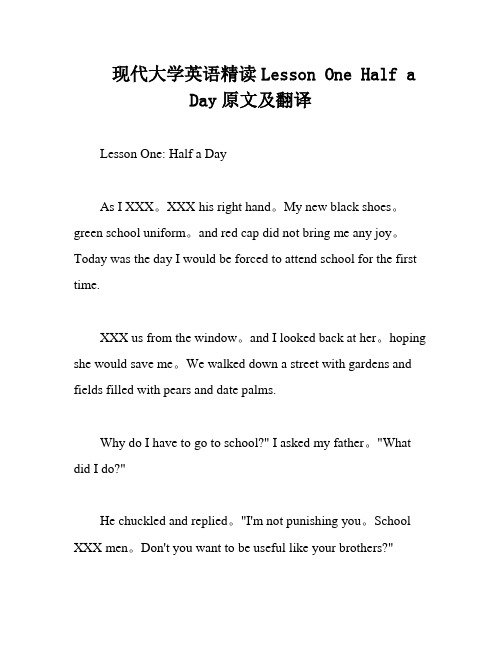
现代大学英语精读Lesson One Half aDay原文及翻译Lesson One: Half a DayAs I XXX。
XXX his right hand。
My new black shoes。
green school uniform。
and red cap did not bring me any joy。
Today was the day I would be forced to attend school for the first time.XXX us from the window。
and I looked back at her。
hoping she would save me。
We walked down a street with gardens and fields filled with pears and date palms.Why do I have to go to school?" I asked my father。
"What did I do?"He chuckled and replied。
"I'm not punishing you。
School XXX men。
Don't you want to be useful like your brothers?"XXX from my home and thrown into a large。
high-walled building would do me any good.When we reached the gate。
the courtyard XXX me to go in alone and join them。
XXX to his hand。
he urged me to be brave and start this new chapter of my life。
现代大学英语 Unit 1 Half a Day
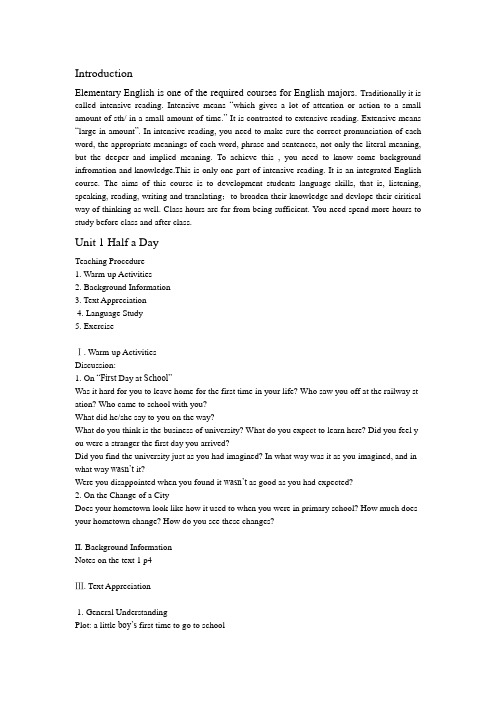
IntroductionElementary English is one of the required courses for English majors. Traditionally it is called intensive reading. Intensive means “which gives a lot of attention or action to a small amount of sth/ in a small amount of time.” It is contrasted to extensive reading. Extensive means “large in amount”. In intensive reading, you need to make sure the correct pronunciation of each word, the appropriate meanings of each word, phrase and sentences, not only the literal meaning, but the deeper and implied meaning. To achieve this , you need to know some background infromation and knowledge.This is only one part of intensive reading. It is an integrated English course. The aims of this course is to development students language skills, that is, listening, speaking, reading, writing and translating;to broaden their knowledge and devlope their ciritical way of thinking as well. Class hours are far from being sufficient. You need spend more hours to study before class and after class.Unit 1 Half a DayTeaching Procedure1. Warm-up Activities2. Background Information3. Text Appreciation4. Language Study5. ExerciseⅠ. Warm-up ActivitiesDiscussion:1. On “First Day at School”Was it hard for you to leave home for the first time in your life? Who saw you off at the railway st ation? Who came to school with you?What did he/she say to you on the way?What do you think is the business of university? What do you expect to learn here? Did you feel y ou were a stranger the first day you arrived?Did you find the university just as you had imagined? In what way was it as you imagined, and in what way wasn’t it?Were you disappointed when you found it wasn’t as good as you had expected?2. On the Change of a CityDoes your hometown look like how it used to when you were in primary school? How much does your hometown change? How do you see these changes?II. Background InformationNotes on the text 1 p4Ⅲ. Text Appreciation1. General UnderstandingPlot: a little boy’s first time to go to schoolSetting: on the way to schoolat schoolon the way homeProtagonists: ―I‖–the boy in the storyTheme :Writing devices:2. Thematic AnalysisEverything is changing!1. All my clothes are new.2. School makes useful men out of boys.3. My misgivings had had no basis.4. Our path was not totally sweet and unclouded.5. The lady would sometimes smile, but yell and scold often.6. The streets lined with the gardens disappeared.7. I turned out to be a grandpa.What changes are conveyed?changes on my part: clothes’ my view on school; my outer appearancechanges on other people’s part: the lady’s attitude toward uschanges in the society : the street crowded with cars, high buildings, rubbish and childrenThe following are a few possible understandings of the message the story conveys. Which one do you agree with? Argue with your group partners.Time and tide wait for no man.Life is a tragedy. There is nothing permanent in life but change. Education can never keep up wit h changes in society. Life is short and time is precious.Life is a dream. Do not take anything seriously.Time goes by quickly and many things can take place in your lifetime. Before you know it, a new society is born.3. Text StructurePart 1 (paras.1-7 ) : The boy’s misgivings about school. Questions for Part 1:①What does this part tell us about the boy’s relations with his parents?A: It seems that the boy was closer to his mother. Probably his mother was gentle while his father was strict.②How did the boy see school?A: A punishment (P 4); a prison (P6); a dreadful place③Read the following suggestions made by the father. Which ones do you agree with and which ones not? Have you ever been given some suggestions by your parents when entering the university? L ist them out.School is a place that makes useful men out of boys.Don’t you want to be useful like your brothers?Put a smile on your face and be a good example to others. Be a man.Today you truly begin life. A: Open.Part 2 (paras.8-16 ) :How the boy felt about schoolQuestions for Part 2: ① Did the boy change his attitude towards school after entering it? A: P 13.② How many experiences did the boy tell us about the school life? A: P14.Part 3 (paras.17-20 ):Walking out of the school, he found time had changed everything. Questions for Part 3:① What did he see on his way home?A: P17. ② How do you understand the ending? What is the effect of this writing strategy? Do you know any other novels/stories written with the same strategy?A: The protagonist returns after being absent for a short time to find everything changed beyond re cognition.Washington Irving’s Rip Van Winkle. Rip was a simple good-natured man. One fine day he went with his dog to the mountains to hunt squirrels. He drank something a queer old man offered him, and fell fast asleep. When he woke up he found himself an old man and that great changes had occ urred in his village during his absence. In the village inn the portrait of King George 3 had been re placed by one of General Washington. This technique is often used to emphasize rapid changes in society.《贾奉雉》from《聊斋》贾奉雉才名冠世,考试却屡战屡败。
现代大学英语精读1 句子翻译

现代大学英语精读1 句子翻译Unit 1 Half A Day1. 他们利用我们求助无门的困境把我们公司接管了。
They took advantage of our helpless situation and took over our company.2. 虽然我们面前仍有困难,但我肯定我们中国人有智慧靠自己实现国家的和平统一。
Although there are still difficulties ahead of us, I am sure that we Chinese people will have the wisdom to bring about the peaceful unification of our country on our own.3. 只强调国内生产总值是错误的,它会引起很多严重问题。
It is wrong to put emphasis on nothing but GDP. It will give rise to many serious problems.4. 他喜欢炫耀他的财富,但是这完全是徒劳的,人们仍然像躲避毒药那样躲避他。
He loves to show off his wealth, but this is all in vain. People still avoid him as though he were poison.5. 他不久就爱上了这个村子。
他决心和村民一起把这个地方变成一个花园。
He soon fell in love with the village and was determined to make ita beautiful garden together with other villagers.6. 我们必须花更多的钱来和全球气温上升作斗争。
另外,我认为我们还必须采用严厉的法律措施。
这不只是一个钱的问题。
We must spend more money fighting against global warming. In addition, we must resort to tough laws. It is not just a matter of money.7. 当警察到达学校的时候,学生和老师还在一种茫然不知所措的状态。
最新现代大学英语精读Lesson-One-Half-a-Day原文及翻译

Lesson One Half a DayNaguib Mahfous 1. I walked alongside my father, clutching his right hand. All my clothes were new: the black shoes, the green school uniform, and the red cap. They did not make me happy, however, as this was the day I was to be thrown into school for the first time.2. My mother stood at the window watching our progress, and I turned towards her from time to time, hoping she would help. We walked along a street lined with gardens, and fields planted with crops: pears, and date palms.3. "Why school ?" I asked my father. "What have I done ?"4. "I'm not punishing you, " he said, laughing. "School's not a punishment. It's a place that makes useful men out of boys. Don' t you want to be useful like your brothers?"5. I was not convinced. I did not believe there was really any good to be had in tearing me away from my home and throwing me into the huge, high-walled building.6. When we arrived at the gate we could see the courtyard, vast and full of boys and girls. "Go in by yourself, " said my father, "and join them. Put a smile on your face and be a good example to others. "7. I hesitated and clung to his hand, but he gently pushed me from him. "Be a man, " he said. "Today you truly begin life. You will find me waiting for you when it's time to leave. "8. I took a few steps. Then the faces of the boys and girls came into view. I did not know a single one of them, and none of them knew me. I felt I was a stranger who had lost his way. But then some boys began to glance at me in curiosity, and one of them came over and asked, "Who brought you?"9. "My father, " I whispered.10. "My father's dead, " he said simply.11. I did not know what to say. The gate was now closed. Some of the children burst into tears. The bell rang. A lady came along, followed by a group of men. The men began sorting us into ranks. We were formed into an intricate pattern in the great courtyard surrounded by high buildings; from each floor we were overlooked by a long balcony roofed in wood.12. "This is your new home, "said the woman. "There are mothers and fathers here, too. Everything that is enjoyable and beneficial is here. So dry your tears and face life joyfully. "13. Well, it seemed that my misgivings had had no basis. From thefirst moments I made many friends and fell in love with many girls. I had never imagined school would have this rich variety of experiences.14. We played all sorts of games. In the music room we sang our first songs. We also had our first introduction to language. We saw a globe of the Earth, which revolved and showed the various continents and countries. We started learning numbers, and we were told the story of the Creator of the universe. We ate delicious food, took a little nap, and woke up to go on with friendship and love, playing and learning.15. Our path, however, was not totally sweet and unclouded. We had to be observant and patient. It was not all a matter of playing and fooling around. Rivalries could bring about pain and hatred or give rise to fighting. And while the lady would sometimes smile, she would often yell and scold. Even more frequently she would resort to physical punishment.16. In addition, the time for changing one' s mind was over and gone and there was no question of ever returning to the paradise of home. Nothing lay ahead of us but exertion, struggle, and perseverance. Those who were able took advantage of the opportunities for success and happiness that presented themselves.17. The bell rang, announcing the passing of the day and the end of work. The children rushed toward the gate, which was opened again. I said goodbye to friends and sweethearts and passed through the gate. Ilooked around but found no trace of my father, who had promised to be there. I stepped aside to wait. When I had waited for a long time in vain, I decided to return home on my own. I walked a few steps, then came to a startled halt. Good Lord! Where was the street lined with gardens? Where had it disappeared to? When did all these cars invade it? And when did all these people come to rest on its surface? How did these hills of rubbish find their way to cover its sides? And where were the fields that bordered it? High buildings had taken over, the street was full of children, and disturbing noises shook the air. Here and there stood conjurers showing off their tricks or making snakes appear from baskets. Then there was a band announcing the opening of a circus, with clowns and weight lifters walking in front.18. Good God! I was in a daze. My head spun. I almost went crazy. How could all this have happened in half a day, between early morning and sunset? I would find the answer at home with my father. But where was my home? I hurried towards the crossroads, because I remembered that I had to cross the street to reach our house, but the stream of cars would not let up. Extremely irritated, I wondered when I would be able to cross.19. I stood there a long time, until the young boy employed at the ironing shop on the corner came up to me.20. He stretched out his arm and said, "Grandpa, let me take you across."第一课半日1 我走在父亲的一侧,牢牢地抓着他的右手。
现代大学英语 B1U1 课后练习参考答案 Half a Day
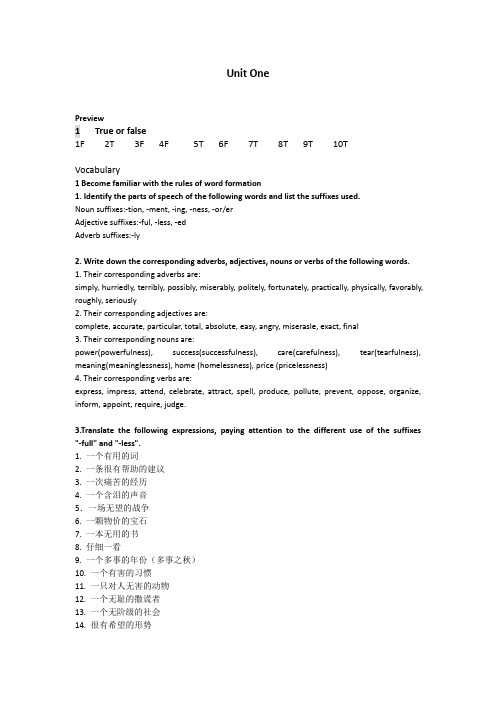
Unit OnePreview1 True or false1F 2T 3F 4F 5T 6F 7T 8T 9T 10TVocabulary1 Become familiar with the rules of word formation1. Identify the parts of speech of the following words and list the suffixes used.Noun suffixes:-tion, -ment, -ing, -ness, -or/erAdjective suffixes:-ful, -less, -edAdverb suffixes:-ly2. Write down the corresponding adverbs, adjectives, nouns or verbs of the following words. 1. Their corresponding adverbs are:simply, hurriedly, terribly, possibly, miserably, politely, fortunately, practically, physically, favorably, roughly, seriously2. Their corresponding adjectives are:complete, accurate, particular, total, absolute, easy, angry, miserasle, exact, final3. Their corresponding nouns are:power(powerfulness), success(successfulness), care(carefulness), tear(tearfulness), meaning(meaninglessness), home (homelessness), price (pricelessness)4. Their corresponding verbs are:express, impress, attend, celebrate, attract, spell, produce, pollute, prevent, oppose, organize, inform, appoint, require, judge.3.Translate the following expressions, paying attention to the different use of the suffixes "-full" and "-less".1. 一个有用的词2. 一条很有帮助的建议3. 一次痛苦的经历4. 一个含泪的声音5.一场无望的战争6. 一颗物价的宝石7. 一本无用的书8. 仔细一看9. 一个多事的年份(多事之秋)10. 一个有害的习惯11. 一只对人无害的动物12. 一个无耻的撒谎者13. 一个无阶级的社会14. 很有希望的形势15. 一次富有成果的访问16. 一支强大的军队17.一个粗心的错误18. 一个无家可归的孩子19. 一个牙齿已掉光的老汉20. 一朵无名的花4 Complete the sentences by translating the Chinese in the brackets.1.differ2.differently, different3.difference4.serious, serious, seriously5.seriousness, seriously polluted6.Fortunately/Luckily, pollution, seriously, pollute7.attention8.attentively, attentive2. Complete the following verb+noun collocations or expressions1. take2. lose/find3. dry4. play5 take/have6. tell/read/write7. change/speak/read/cross8. life/facts/reality/difficulties9. an event/a plan/the news/the death/the marriage10. a country/a place/privacy11. a river/a street/a bridge/a desert/ the sea12. an end/ a decision/a place13. workers/waiters/servants/people3 Fill in the blanks with the correct forms of the phrases and expression listed below. Some of them may be used more than once and there may be more than one correct answer.1.on their own2.show off3.burst into4.given rise to5.brought about6.to resort to7.clinging to8.gave rise to9.took advantage of10.in vain, make, out of4 Translate the following sentences using words and expressions taken from the text1.They took advantage of our helpless situation and took over our company.2.Although there are still difficulties ahead of us, I am sure that we Chinese people will havethe wisdom to bring about the peaceful unification of our country on our own.3.It is wrong to put emphasis on nothing but GDP. It will give rise to many serious problems.4.He loves to show off his wealth, but that is all in vain. People still avoid him as though hewere poison.5.He soon fell in love with the village and was determined to make it a beautiful gardentogether with other villagers.6.We must spend more money fighting against global warming. In addition, we must resort totough laws. It is not just a matter of money.7.When the police arrived at the school, the students and teachers were still in a daze.8.This corrupt official was still clinging to his power. He refused to step aside.9.When the man finally came into view, I found it was my father. I didn’t know how hemanaged to find this place in the blinding snow. At that moment, I burst into tears.10.She glanced at him from time to time. It was the first time in her life that she had foundherself looking at a young man like that.5 Fill in the blanks with the correct prepositions or adverbs.1.of2.from3.for4.out5.up6.up7.up for8.out9.with10.of11.of12.of13.up6. Complete the sentences by translating the Chinese in the brackets1.the door locked, very angry2.the city gate wide open, playing the guqin, it very strange3.quite obvious/clear, his successor4.worried/anxious, talking to yourself5.so heavily polluted, pay (the price)6.the ground shaking/trembling/quaking, rolling downugh, laugh himself8.put these things in order, do it9.lying in the grass, covered with blood10.interested in gardening or painting, keep him busy11.hear her say, put off/postponed7 Fill in each blank with the correct form of the appropriate word or phrase in the brackets. Note that more than one of them may be appropriate1.high/tall, huge2.vast, high3.tall, big/large4.every, affairs5.matter, countries/nations, big/huge6.affair, nation, matter7.state8. a few, big/huge/great, high9.everything, something10.Anybody, any ,nothing, nothing, nothing11.little, few, a little, a fewGrammar1. Combine each pair of the sentences following on e of the examples1. Those who went the lecture hall early had the front seats.2. A dictionary is a book that explains the meaning and usage of words.3. A library is a building or an organization that has a collection of books for people to read or borrow.4. The man employed at the drug store is my cousin.5. Those who want o join the drama club please sign up here.6. I was born in a village surrounded by hills on three sides.7. In the center of the room stood a large table covered with the cleanest tablecloth I had ever seen.8. Those who had the least to give often gave the most9. God teachers are those who encourage students to work on their own and think for themselves.3. Fill in the blanks with ONE suitable word.1. easy2. beginning3. But4. suddenly5. worried6. If7. master8. number 9. habit 10. go4 Translate the following sentences into English.1.Before I came to/entered college, I had never thought life at college would be so rich andinteresting.2.Most of the Chinese college students born in the 1990s are the only child of their families.3.All those who know him admire him for his work.4.I missed the class because I didn’t know it had moved up to Thursday.5.In some countries, those who are overweight will be punished one way or another.6.Soon after the fire, those who had lost their homes were taken to a place of safety.7.When we met again, we found we both had changed a lot.8. A team of experts headed by Professor Li will soon come and help farmers solve theirproblems.9.The field planted with tomatoes used to be wasteland.10.Our teacher told us to read books written by such masters as Mao Dun and Ba Jin.5. Identify and correct the mistake(s) in each of the sentences1. Every day, my father takes me to school himself.2. Hardship can turn a boy into a man. /Hardships can make a man out of a boy.3. We tried to persuade him not to do that, but in vain.4. Last week, I read an interesting story that h ad taken place during WWII5. He searched his room for the book but I didn't find it.6. I tried to put on a brace face, but failed.7. We must take advantage of the opportunities coming our way.8. When I was a small boy, I would often sit for hours playing with the few toys I had.9. Sixteen years of teaching school mad/have made an experienced educator out of a timid girl.10. Before I came, I had imagined college was a paradise where I could relax after stressful three years of high school.。
现代大学英语第一册 unit 1 Half a Day
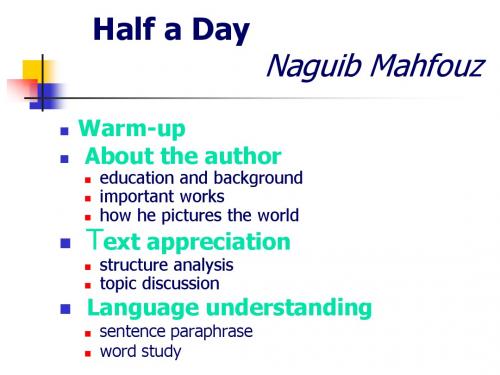
Naguib Mahfouz —— important works
The Cairo Trilogy (published 1955-1957) is a tale of the lives of a Muslim family and spans(跨过) the first half of the 20th century. Each book in the trilogy was named after a suburb of Cairo. The first, Palace Walk(《宫间街》) was set during the British occupation of Egypt early in the century. The second, Palace of Desire(《思宫街》) covered the changing times of the 1920s. The third book, Sugar Street(《甘露街》) brings the family into the mid 20th century. In this final part the head of the family is now old and frail(weak). He surveys the world while the main story centers on the
Warm-up
All the groups are required to do a roleplay about your first day at college. Any creative form of activities is welcome, such as group discussion, interview, TV program, talk show, group performance, etc. It is better to fly your imagination to act out the vivid scene.
现代大学英语1单元
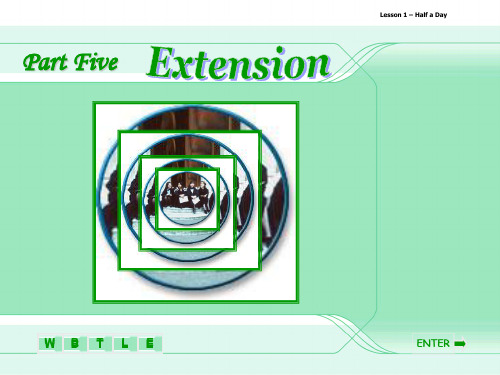
WB T L E
The end of Debating.
II. Quiz
List: 1. Quiz 1 2. Quiz 2 3. Quiz 3
WB T L E
Lesson 1 – Half a Day
Lesson 1 – Half a Day
II. Quiz 1
Put in appropriate prepositions or adverbs:
WB T L E
The end of Quiz 1.
Lesson 1 – Half a Day
6. on 7. out of 8. out of, at 9. up 10. on
Lesson 1 – Half a Day
II. Quiz 2
1. When doing business in the Arab world, do not
—Spencer, Herbert Education is a progressive discovery of our own ignorance.
—W. Durant Education makes a people easy to lead, but difficult to drive; easy to govern but impossible to slave.
Lesson 1 – Half a Day
WB T L E
I. Oral Work
Lesson 1 – Half a Day
If you had only half a day left to live, what would you most want to do? List the top five things you would do and give us your reason. Suppose the narrator found his home at last. What would happen after that? Work in groups. Make up your own story of “Half a Day” and perform it. Tell your funny stories about your first day at school.
现代大学英语精读第一册第一课课件Lesson1HalfaDay(可编辑)
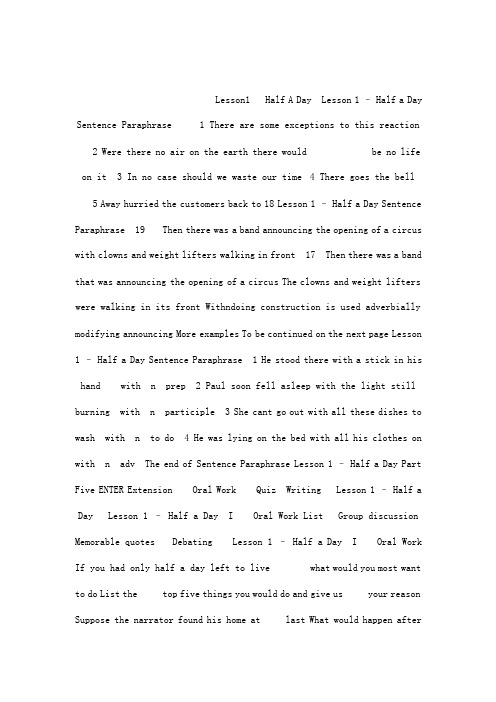
Lesson1 Half A Day Lesson 1 –Half a Day Sentence Paraphrase 1 There are some exceptions to this reaction2 Were there no air on the earth there would be no life on it3 In no case should we waste our time4 There goes the bell5 Away hurried the customers back to 18 Lesson 1 –Half a Day Sentence Paraphrase 19 Then there was a band announcing the opening of a circus with clowns and weight lifters walking in front 17 Then there was a band that was announcing the opening of a circus The clowns and weight lifters were walking in its front Withndoing construction is used adverbially modifying announcing More examples To be continued on the next page Lesson1 –Half a Day Sentence Paraphrase 1 He stood there with a stick in his hand with n prep2 Paul soon fell asleep with the light still burning with n participle3 She cant go out with all these dishes to wash with n to do4 He was lying on the bed with all his clothes on with n adv The end of Sentence Paraphrase Lesson 1 –Half a Day Part Five ENTER Extension Oral Work Quiz Writing Lesson 1 –Half a Day Lesson 1 – Half a Day I Oral Work List Group discussion Memorable quotes Debating Lesson 1 – Half a Day I Oral Work If you had only half a day left to live what would you most want to do List the top five things you would do and give us your reason Suppose the narrator found his home at last What would happen afterthat Work in groups Make up your own story of Half a Day and perform it Tell your funny stories about your first day at schoolBrainstorm in groups The end of Group discussion Lesson 1 –Half a DayI Oral Work Education has for its object the formation ofcharacter SpencerHerbert Education is a progressive discovery of our own ignorance W Durant Education makes a people easy to lead but difficult todrive easy to govern but impossible to slave H P Brougham How do you understand the following quotes Translation Tobe continued on the next page Lesson 1 – Half a Day I Oral Work教育以造就人的品质为其目标斯宾塞英格兰哲学家教育是一个逐步发现自己无知的过程杜兰特美国历史学家散文家教育使一个国家的人民容易领导但是难于驱使容易治理却不可奴役布罗厄姆英国政治家 The end of Memorable quotes Lesson 1 – Half a Day Howdid the boy feel the first day he went to school What happened the firstday at school How did the boy like school life Was school life just a matterof playing and fooling around What did he see on his way home Text AnalysisFurther discussion on the text The end of Further Discussion Lesson 1– Half a Day Writing Devices Now observe the following paragraphcarefully What strikes you most I did not know what to say The gatewas now closed Some of the children burst into tears The bell rang A ladycame along followed by a group of men The men began sorting us into ranksWe were formed into an intricate pattern in the great courtyard surroundedby high buildings from each floor we were overlooked by a long balconyroofed in wood Para 11 The great use of short and simple sentencesTo be continued on the next page Lesson 1 – Half a Day Writing DevicesMore examples I walked a few steps then came to a startled halt Good LordWhere was the street lined with gardens Where had it disappeared to Whendid all these cars invade it And when did all these people come to reston its surface How did these hills of rubbish find their way to cover itssides And where were the fields that bordered it High buildings had takenover the street was full of children and disturbing noises shook the airPara 17 Good God I was in a daze My head spun I almost went crazy Para18 Why did the author prefer to use short and s。
现代大学英语1unit1halfaday
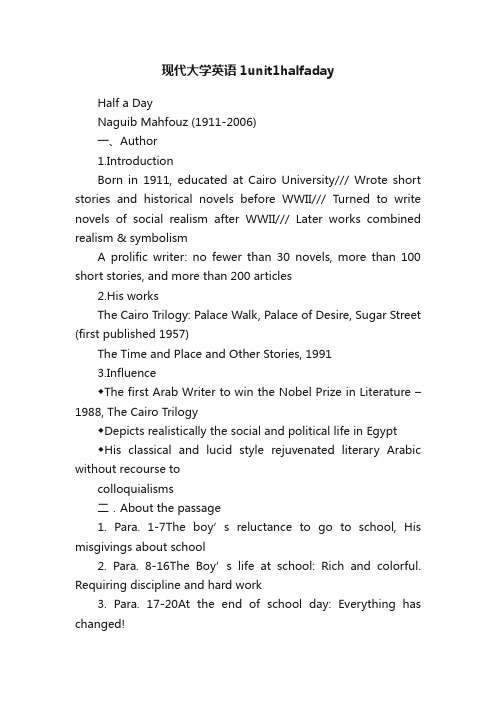
现代大学英语1unit1halfadayHalf a DayNaguib Mahfouz (1911-2006)一、Author1.IntroductionBorn in 1911, educated at Cairo University/// Wrote short stories and historical novels before WWII/// Turned to write novels of social realism after WWII/// Later works combined realism & symbolismA prolific writer: no fewer than 30 novels, more than 100 short stories, and more than 200 articles2.His worksThe Cairo Trilogy: Palace Walk, Palace of Desire, Sugar Street (first published 1957)The Time and Place and Other Stories, 19913.Influence◆The first Arab Writer to win the Nobel Prize in Literature –1988, The Cairo Trilogy◆Depicts realistically the social and political life in Egypt◆His classical and lucid style rejuvenated literary Arabic without recourse tocolloquialisms二.About the passage1. Para. 1-7The boy’s reluctance to go to school, His misgivings about school2. Para. 8-16The Boy’s life at school: Rich and colorful. Requiring discipline and hard work3. Para. 17-20At the end of school day: Everything has changed!A Short StoryPlot: a little boy’s first time to go to schoolSetting: on the way to school // at school // on the way home Protagonist/Narrator: “I” –the boy in the storyTheme of the story: what do you think?三.Language points1. clutch( h old tightly, usu. in fear, anxiety, or pain)clutch (to/onto)sb./sth. // be in sb’s clutch // fall/get into the clutch of sb.Silent and pale, the girl clutched (to/onto) her mother’s chest.A drowning man will clutch at a strawClutching the money in his hand, he hurried to the bank.2.in the year/by the time/the moment作先行词时省wheneg. I was born in the year china began its open and reform policy.By the time the ambulance arrived, it was too late.The moment I saw him, I recognized he was the criminal wanted by the police.3.throw sb. Into /out of sp.force to go to The burglar was thrown into prison.cause to be in a state of The news of an international war threw the whole nation into panic.Be devoted to doing. After a break, the students threw t hemselves into their studies. Phases:throw oneself at 猛然扑向throw back 拒绝,丢回来throw oneself on 依靠,听命于throw off 脱去,扔掉throw away 扔掉,抛弃4.make … out of cause to become把某人变成。
现代大学英语精读1lesson1halfaday
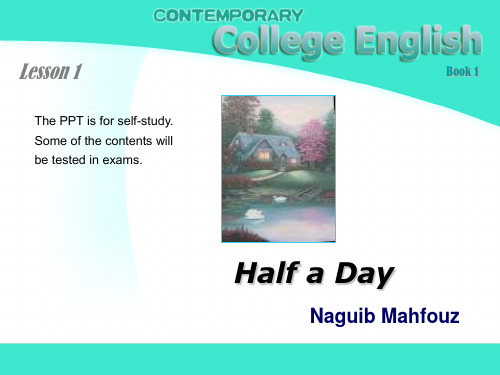
The end of Creator of the Universe.
Christians believe that the
world was created by God. So here “Creator 〞 means God.
Lesson 1 – Half a Day
To be continued on the next page.
The University of Cairo
Lesson 1 – Half a Day
The end of Author.
II. His works
Naguib Mahfouz was the first Arab to win the Nobel prize for literature, in 1988. He has been described as "a Dickens of the Cairo cafés" and "the Balzac of Egypt". He is now the author of no fewer than 30 novels, more than 100 short stories, and more than 200 articles. Half of his novels have been made into films which have circulated throughout the Arabic-speaking world.
To be continued on the next page.
Lesson 1 – Half a Day
Lesson 1 – Half a Day
现代大学英语第一册Lesson-1-Half-A-Day课件(ppt文档)

A Poem
First Day at School
It’s hard to explain, the way I feel; A place unknown but is so real! A soft voice welcomes me to the place, I look up to see a lady’s smiling face.
thorough, systematic, sustained, all-around training listening, reading, speaking, writing, translating skills
Intensive reading training develops through different stages, each stage with its own emphasis
To help students both clarify and consolidate grammar knowledge, particularly in terms of use
To help students further develop basic reading skills
Intensive reading is not evaluated by the course alone; its assessment has to be done in relation to the overall development of all the basic skills in all the courses
I feel like I’m on a roller coaster, which never seems to end.
现代大学英语1-unit-1-half-a-day

2019/10/23
Comprehensive Reading ---- The author His writing style
His works combined realism & symbolism
In this text, a strategy used in
fiction writing---the
2019/10/23
Comprehensive Reading ---- The author
His influence
The first Arab Writer to win the Nobel Prize in Literature – 1988, The Cairo Trilogy
His works have been compared in spirit and tone to
Lead-in Activity
Forest Gump
Lead-in Activity
Forest Gump
Comprehensive reading
Comprehensive Reading ---- The author
Naguib Mahfouz 1911-2006
His life
纳吉布·马哈富兹
2019/10/23
Example in the text
Comprehensive Reading ---- The author
山中方一(七)日, 世上已千年。
2019/10/23
《水经注》
“信安山(烂柯山)有石室, 王质入其室,见二童子对弈, 看之。局未终,视其所执伐薪 柯已烂朽,遂归,乡里已非矣 。”
Lead-in Activity
Half a Day 课后答案

现代大学英语精读Book One 课后练习答案Unit One Half a DayV ocabulary1 Become familiar with the rules of word formationI identify the parts of speech of the following words and list the suffixes used.Noun suffixes:-tion,-ment, -ing, -ness, -or/erAdjective suffixes: -ful, -less, -ed.Adverb suffixes: -ly2 Write down the corresponding adverbs, adjectives, nouns or verbs of the following words.1. Their corresponding adverbs are:Simply,hurriedly,terribly,possibly,miserably,politely,fortunately,practically, physically, favorably, roughly, seriously.2. Their corresponding adjectives are:Complete, accurate, particular, total, absolute, easy, angry, miserable, exact, final.3. Their corresponding nouns are:Power(powerfulness),success(successfulness),care(carefulness),tear(tearfulness), meaning(meaninglessness), home(homelessness), price (pricelessness)4. Their corresponding verbs are:Express, impress, attend, celebrate, attract, spell, produce, pollute, prevent, oppose, organize, inform, appoint, require, judge.3 Translate1. 一个有用的词,2一条很有帮助的建议3. 一次痛苦的经历4. 一个含泪的声音5. 一场无望的战争 6 一颗无价的宝石7. 一本无用的书8. 仔细一看9. 一个多事的年份10.一个有害的习惯11. 一只对人无害的动物12. 一个无耻的撒谎者13.一个无阶级的社会14. 很有希望的形势15.一次富有成果的访问16. 一支强大的军队17. 一个粗心的错误18. 一个无家可的孩子19. 一个牙齿已掉光的老汉20.一朵无名的花。
Unit1-现代大学英语精读第一册Half-a-Day答案

现代大学英语精读Book One 课后练习答案Unit One Half a DayV ocabulary1 Become familiar with the rules of word formationI identify the parts of speech of the following words and list the suffixes used.Noun suffixes:-tion,-ment, -ing, -ness, -or/erAdjective suffixes: -ful, -less, -ed.Adverb suffixes: -ly2 Write down the corresponding adverbs, adjectives, nouns or verbs of the following words.1. Their corresponding adverbs are:Simply, hurriedly, terribly, possibly, miserably, politely, fortunately, practically, physically, favorably, roughly, seriously.2. Their corresponding adjectives are:Complete, accurate, particular, total, absolute, easy, angry, miserable, exact, final.3. Their corresponding nouns are:Power(powerfulness), success(successfulness), care(carefulness),tear(tearfulness), meaning(meaninglessness), home(homelessness), price (pricelessness)4. Their corresponding verbs are:Express, impress, attend, celebrate, attract, spell, produce, pollute, prevent, oppose, organize, inform, appoint, require, judge.3 Translate1. 一个有用的词,2一条很有帮助的建议3. 一次痛苦的经历4. 一个含泪的声音5. 一场无望的战争 6 一颗无价的宝石7. 一本无用的书8. 仔细一看9. 一个多事的年份10.一个有害的习惯11. 一只对人无害的动物12. 一个无耻的撒谎者13.一个无阶级的社会14. 很有希望的形势15.一次富有成果的访问16. 一支强大的军队17. 一个粗心的错误18. 一个无家可的孩子19. 一个牙齿已掉光的老汉20.一朵无名的花。
- 1、下载文档前请自行甄别文档内容的完整性,平台不提供额外的编辑、内容补充、找答案等附加服务。
- 2、"仅部分预览"的文档,不可在线预览部分如存在完整性等问题,可反馈申请退款(可完整预览的文档不适用该条件!)。
- 3、如文档侵犯您的权益,请联系客服反馈,我们会尽快为您处理(人工客服工作时间:9:00-18:30)。
—— how he pictures the world
The picture of the world as it emerges(出现) from the bulk (大量) of Mahfouz‟s work is very gloomy (暗淡的;阴沉的;令人沮丧的) indeed, though not completely disappointing. It shows that the author‟s social utopia (乌托邦;理想国)is far from being realized. Mahfouz seems to conceive o f(构思;想象) time as a force of oppression. His novels have consistently shown time as the carrier of change, and change as a very painful process, and very often time is not content until it has dealt his heroes the final blow of death.
How the boy felt about school. Walking out of the school, he found time had changed everything.
Text Appreciation
for group discussion in class
• • • • • Plot of the story: Setting of the story: Protagonist v.s. Antagonists: Drama of the story lies in: Writing technique: (Have you ever read a story using the similar technique?) • Theme of the story:
Naguib Mahfouz was born on the 11th Dec. 1911 in an old quarter of Cairo, the youngest son of a merchant. He studied philosophy(哲学) at King Faud I (now Cairo) University, graduating in 1934. He worked in university administration(行政部门) and then in 1939 he worked for the Ministry of Islamic Affairs. He was later Head of the State Cinema Organization at the Ministry of Culture(文化 部). He also worked as a journalist(记者).
Camp David Accords: popular name for
the historic peace accords in 1978 between Israel and Egypt.
The official agreement was signed on Mar. 26, 1979, in Washington, D.C. by Israeli Prime Minister Menachem Begin(比金)and Egyptian President Anwar al-Sadat(沙達 特), with U.S. President Jimmy Carter signing as a witness (证人). Under the pact, which was denounced (公开指 责)by other Arab states, Israel agreed to return the Sinai (西奈(半岛) )to Egypt, a transfer(转移;转让) that was completed in 1982. In a joint letter the two nations also agreed to negotiate(谈判) Palestinian(巴勒斯坦) autonomy(自主) measures in the Israeli-occupied West Bank and Gaza Strip(加沙(西南亚地中海岸港市,巴勒斯 坦的一部分,1967年被以色列占领), but in fact no progress was made on this issue before Sadat„s assassination (暗杀) in Oct., 1981.
Unit 1 Half a Day Naguib Mahfouz
• About the author
– education and background – important works – how he pictures the world – structure analysis – topic discussion
Naguib Mahfouz —— important works
Naguib Mahfouz —— important works
Cairo
Naguib Mahfouz —— important works
Works of his second writing period: The Children of Gebelawi (1959) The Thief and the Dogs (1961) Autumn Quail (1962) Small Talk on the Nile (1966) Miramar (1967) several collections of short stories.
Naguib Mahfouz
Text Appreciation
• Structure of the text Part 1 (para. 1- 7 about: ) Part 2 (para. Part 3 (para. ) 8-16 about:
17-20 ) about:
The boy’s misgivings about school
• Text appreciation
– sentence paraphrase – word study & phrases – Assignment
• Language understanding
Naguib Mahfouz 纳吉布•马福兹
Naguib Mahfouz —Education & Background
Naguib Mahfouz —Education & Backgrounguib Mahfouz —— important works
Naguib Mahfouz was the first Arab to win the Nobel prize for literature, in 1988. He has been described as “a Dickens(迪更斯1812-1870, 英国著 名现实主义小说家)of the Cairo cafés” and “the Balzac(巴尔扎克1799-1850, 法国小说家) of Egypt". He is now the author of no fewer than 30 novels, more than 100 short stories, and more than 200 articles. Half of his novels have been made into films which have circulated (流通;传播) throughout the Arabic-speaking world.
Naguib Mahfouz —— important works
The Cairo Trilogy (published 1955-1957) is a tale of the lives of a Muslim family and spans(跨过) the first half of the 20th century. Each book in the trilogy was named after a suburb of Cairo. The first, Palace Walk was set during the British occupation of Egypt early in the century. The second, Palace of Desire covered the changing times of the 1920s. The third book, Sugar Street brings the family into the mid 20th century. In this final part the head of the family is now old and frail(weak). He surveys the world while the main story centers on the grandsons.
Naguib Mahfouz
—— how he pictures the world
To sum up, in Mahfouz‟s dark description of the world there are only two bright spots(点). These consist of man's continuing struggle for equality on the one hand and the promise of scientific progress on the other; meanwhile, life is a tragedy.
